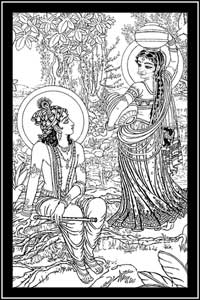

Badger, California: May 19, 2003
[Last night, Sri Radhastami Eve, Srila Narayana Maharaja spoke about the glories of Srimati Radharani, primarily from Sri Caitanya-caritamrta Adi-lila 4. 122-276. This morning, Sri Radhastami Day, Srila Maharaja first offered his brand-newly-published translation of Srila Jayadeva Gosvami's Sri Gita-Govinda to the Sri Vigraha of his Guru Maharaja, Srila Bhakti Prajnana Kesava Gosvami Maharaja, on the altar of Sri Sri Radha-Vinoda-vihariji, at Sri Kesavaji Gaudiya Matha in Mathura. After that he sat on his Vyasasana and began glorifying that divine book. He said that if we want to know the glory of Sri Sri Radha and Krsna, and if we want to understand the topic of rasa, we must study this Gita-Govinda. He said that when Sri Caitanya Mahaprabhu was staying at the Gambira, He was totally absorbed in the kirtanas of this book, and now the book has come out with pictures and an easy-to-understand Hindi translation of the commentaries of our previous acaryas. He expressed his heartfelt thanks to all the devotees who helped him make the publication. He said that he now had 200 advanced copies and that in the next ten days 5,000 more will be printed, and he also ordered that the English translation should come out as soon as possible. He concluded the glorification by saying that When Sri Caitanya Mahaprabhu heard the introductory song of this book, Sri Mangala-gitam, He became like a mad person, and that we should also become similarly absorbed. He then had the devotees sing Sri Mangala-gitam, Sri Radha Krpa Kataksa, Sri Nanda-nandanastakam, and other Sanskrit kirtanas, and he elaborately discussed the deep meanings of these songs.
When his class was completed, Srila Maharaja directed the beautiful bathing ceremony of the vijaya-vigraha deities of Sri Sri Radha-Vinodabihariji with pancamrta: honey, ghee, sugar, milk, yogurt and water, and all this was accompanied by sweet kirtanas glorifying Srimati Radhika.
The following is a lecture given by Srila Maharaja on the glory of Sri Gita-Govinda on his recent tour:]
[Srila Narayana Maharaja requested a new disciple to sing a bhajana, after which he began his class:]
My Gurudeva, Parama-pujyapada Srila Bhakti Prajnana Kesava Gosvami Maharaja, was once staying with Srila Bhaktisiddhanta Sarasvati Gosvami Prabhupada in Sri Caitanya Mahaprabhu's home, Sri Jagannath Bhavana, at the Yogapitha in Sri Mayapura. At that time a disciple of Srila Bhaktivinoda Thakura came and told my Gurudeva, "I want to sing some songs while playing harmonium." This disciple pressured my Gurudeva, saying, "You are a very good boy; you should stay and hear." The disciple then began to do his raga-ragini with the harmonium, and he was singing this song: "Raya jago raya jago raya jago re." Raya means Radhika, and the line means, "O Radhika, now it is morning; You should wake up."
Srila Prabhupada somehow heard that Sri Vinoda-vihari brahmacari was hearing that song. He at once called him and told him, "Oh, raya jago raya jago – he should first awaken himself and then he can awaken Raya! He should not be worried about Raya! Krsna is sufficient to awaken Her, and Lalita and Visakha are also sufficient. You should not hear from him again." From that very day Srila Bhakti Prajnana Kesava Gosvami Maharaja became very careful to avoid that type of singing.
The harmonium should be used only when necessary. Otherwise, those who are singing while playing the harmonium will think, "I know I am the best among all. I know that I sing in a very good tune, because Maharaja always allows me to sing while playing the harmonium."
There is a song by Srila Narottama dasa Thakura:
hari hari, kabe mora hoibe sudina bhajibo sri radha-krsna hoiya premadhina
["O Sri Hari, when will that auspicious day be mine? Filled with prema, when will I worship Sri Radha-Krsna?"
(Hari Hari, Kabe More Hoibe Sudina, verse 1)]
suyantre misaiya ga’bo sumadhura tana anande koribo duhara rupa-guna-gana
["As the sounds of the divine instruments mix and create the sweetest melodies, I will blissfully sing songs about Their forms and qualities."Guru Maharaja would tell his followers to explain that in the line, "Suyantre misaiya ga’bo sumadhura tana", 'suyantre' (sounds of divine instruments) means 'kola karatale' (mrdangas and kartalas). Otherwise people will think that suyantre means harmonium and all other similar instruments. Srila Bhaktisiddhanta Sarasvati Thakura was very strict – a thousand times more then I.
(Hari Hari, Kabe More Hoibe Sudina, verse 2)]
[Srila Narayana Maharaja then addressed Manjari dasi:] Now you should sing a song from Sri Gita-Govinda along with the harmonium.
[Manjari dasi sings verses 2 and 3 from chapter 2 of Sri Gita-Govinda]
sancaradadhara sudha madhura dvani mukharita mohana vamsam valita drgancala cancala mauli kapola vilola vatamsam rase harim iha vihita vilasam smarati mano mama krta praihasam
[“O dear one, Sri Krsna's loving smile during His rasa pastimes still awakens within My mind. Aha! As His sweet lips blew into His enchanting flute, His eyes were restless and full of longing; thus His crown tilted as His earrings played over His cheeks.”]
candraka caru mayura sikhandaka mandala balayita kesam pracura puradara dhanuranranjita medura mudira suvesam rase harim iha vihita vilasam smarati mano mama krta parihasam
[“Krsna’s hair, decorated by peacock feathers in the curvature of a half moon, looked like a glistening cloud sheltering many rainbows.]
[Srila Narayana Maharaja:] This song is very exalted. Sometimes Srimati Radhika – with or without reason, or with a shadow of a reason, or having created a reason in Her mind – becomes maanavati. Maanavati means sulky (with transcendental loving jealous anger). Once, when Sri Krsna approached Her while she was in that mood, She told Him, "O Black, You should go away from here." And She turned Her face away from Him. He continually begged Her to forgive Him; but that day Her maan was very strong and at last He left that place.
After Sri Krsna left, Lalita-devi saw that Srimati Radhika was greatly lamenting and weeping for Him, and singing, "Why did I do what I did? Smarati mano mama. Now I am remembering how He came to Me, how sweet He was, how He placed His flute at My lotus feet. Oh, why did I do maan? Fie on Me! Why I did I do so?" She was continually repenting, thinking, "How very lovingly He talks, and how He can take anyone's heart so easily."
Then Lalita said, "Why can’t You forget Him?"
Srimati Radhika said, "How can I forget Him? This is the thing – I want to forget Him, but I cannot."
Lalita replied, "Then what can I do? I cannot help You! I told you to give up that Black One, but you do not obey me. So what can I do?!"
Srimati Radhika is always manifesting these moods.
Sri Gita-Govinda is a "jewel book" brought by Sri Caitanya Mahaprabhu. We all know that Sri Jayadeva Gosvami has written this beautiful Gita Govinda, but without Sri Caitanya Mahaprabhu it would have remained locked like a pearl in the oyster shell or a jewel in a locked case. Sri Caitanya Mahaprabhu manifested the glories of Sri Gita Govinda. Just as without Srila Rupa Gosvami no one would have known the inner moods of Sri Caitanya Mahaprabhu, similarly, by Sri Caitanya Mahaprabhu relishing the moods of Sri Gita Govinda its glories became manifest for the whole world. I have explained this very high-class philosophy, but only rare devotees in this world can understand it. I have called you here only to give you this.
Always remember that any karma, jnana, yoga, tapasya, and worldly matters should not cover your bhakti. Don’t give importance to anything other than bhakti. If anything is favorable for preaching bhakti, we use it, but not very much. Always remember that pure bhakti is our aim and object. This was also the aim of Srila Rupa Gosvami, of all Sri Rupanuga Vaisnavas, and of Parama-pujyapada, Srila Bhaktivedanta Swami Maharaja and myself. I have come only to sprinkle these sacred truths.
[Srila Narayana Maharaja again asked Manjari dasi:] Any more songs of Sri Gita-Govinda? If not, you can do sing srita-kamala kuca-mandala [the Introductory song of Gita-Govinda].
[Srila Maharaja again addresses the audience:] Now our subject is so high, and I request you all to hear this sweet and powerful katha [discussion about Bhagavan Sri Krsna] very carefully. I know that although some of the devotees are now hearing, after my departure from here they will keep my words in cold storage. Never keep this in cold storage. Try to repeat in your mind what we have discussed. If anything else comes in your mind after hearing hari-katha and you repeat that thing, the hari-katha may go out of your heart. In the evening, therefore, before going to sleep, remember all these topics and try to make them yours. I have given hari-katha for you, so try daily to remember what I have said and try to note it down in your hearts. We are discussing very exalted topics.
Editorial advisors: Pujyapada Madhava Maharaja and Sripad Brajanatha dasa
Transcriber: Janaki dasi
Typist: Anita dasi
Editor: Syamarani dasi
HTML: Bhutabhavana dasa
![[BVML Home Page]](../grfx/bml_logo.gif)
